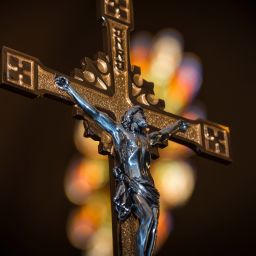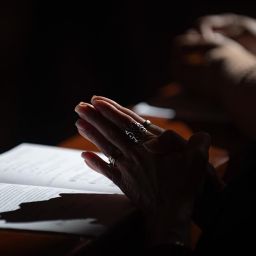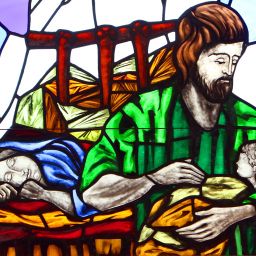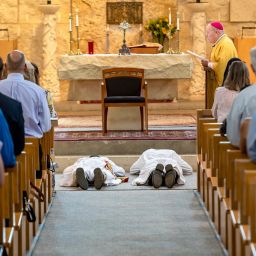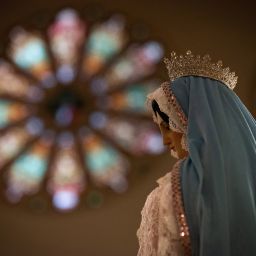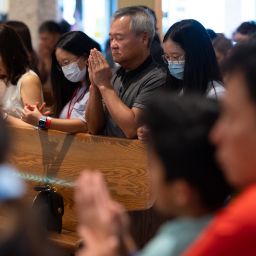By Father Thomas Esposito, O. Cist.
Special to The Texas Catholic
The more I reflect on the petitions of the Our Father, the more I’m convinced that I have no idea what I’m praying when I mumble those words multiple times every day.
The current object of my loving mystification is “Thy kingdom come.” In an effort to be slightly less intimidated by this vast and marvelous petition, I will arrange my musings as responses to the time-honored journalistic questions.
Who is the kingdom?
The strangest question of the lot is the easiest to answer: Jesus Himself, according to several Church fathers, is the kingdom, the “autobasileia.” Where He is, there is the kingdom. That is the immediate shock of the first words Jesus proclaims in Mark’s Gospel: “This is the time of fulfillment. The kingdom of God is at hand. Repent, and believe in the Gospel” (Mark 1:15). Jesus is both the kingdom and the Gospel. He brings us good news and makes all things new by lowering Himself to the level of our humanity.
What is the kingdom?
This question is tied with all the remaining questions for the title of “most impossible to answer.” The kingdom is the authority of God over all things, including the forces of evil: “But if it is by the finger of God that I drive out demons, then the kingdom of God has come upon you” (Luke 11:20). That authority is manifested through the Church, but it is not exhausted by the borders of the Church. The kingdom is the sovereignty of God established over the created order, the cosmos, human societies and governments, humanity, every individual. It is our participation in the glorious joy of His love, even if the created order (and certainly societies and governments) does not yet acknowledge His full and absolute Lordship.
Where is the kingdom coming?
Jesus provides a hint in Luke’s Gospel: “The coming of the kingdom of God cannot be observed, and no one will announce, ‘Look, here it is,’ or ‘There it is’” (Luke 17:20). In other words, don’t trust anyone who answers this question. But Jesus immediately adds, “For behold, the kingdom of God is ‘entos humōn’” (Luke 17:21). Translating that phrase reveals the mystery — “entos” can mean “among,” “in the midst of,” and “within.” The plural “humōn,” “y’all,” suggests a public setting, but the kingdom is also an interior reality: “Behold, I stand at the door and knock. If anyone hears my voice and opens the door, [then] I will enter his house and dine with him, and he with me” (Revelation 3:20).
When is the kingdom coming?
It already has come, thanks to the incarnation, death, and resurrection of Jesus. It is already here, thanks to the Eucharist, the life of the Church, and the charity we show to our neighbor. It has not yet come in its fullness, since humanity and creation still labor under the domain of principalities and powers, the forces of sin and death, who resist His rule (Ephesians 6:12). All three of these statements are equally true.
Why is the kingdom coming?
Love. This one wasn’t actually so difficult. Love is the beginning and end drawing all things and all souls to Himself: “Whoever loves me will keep my word, and my Father will love him, and we will come to him and make our dwelling with him” (John 14:23).
How is the kingdom coming?
As slowly as our gradual and painful conquest of sin and selfishness, and as surely as the certainty that Christ is inviting us to inherit the kingdom that He and the Father have prepared for us (see Matthew 25:34; John 14:1-6). It cannot come about in a purely utopian, earthly society, whether secular or religious; nor will anyone achieve it by themselves in a private “spiritual but not religious” self-realization. The kingdom comes when you live in accordance with the Gospel, joyful fidelity to the Church, and the merciful charity that draws you out of your selfish ego.
The fact that Jesus instructs His disciples, then as now, to pray with the imperative “May Your kingdom come” means that there is something about the kingdom that is yet to be completed. That is why we still pray it — God reminds us daily that He is still at work in and through us.
Father Thomas Esposito, O.Cist., is a monk at the Cistercian Abbey of Our Lady of Dallas and teaches in the theology department at the University of Dallas.
Cutline for featured image: A stained-glass window at St. Francis Xavier Cathedral in Green Bay depicts Jesus as Christ the King. (OSV News file photo/Sam Lucero)



